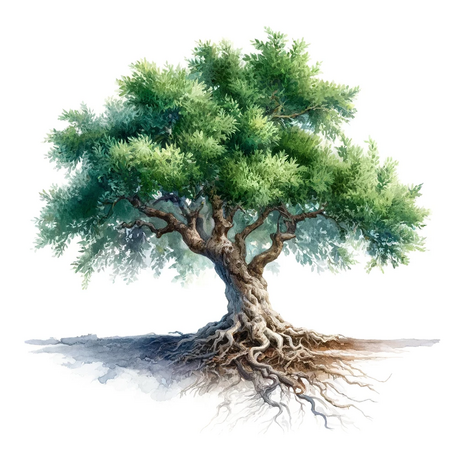Argan tree

The argan tree: a portrait
Before we look at the effects of argan oil on dogs, it is important to understand the origin of this oil. The argan tree(Argania spinosa) is a species of plant in the sapote family that grows exclusively in a limited area in southwestern Morocco and some parts of Algeria. This tree is known for its ability to thrive in extreme weather conditions and plays an important role in the ecology and economy of the region.
Argan oil: a gift of nature
The oil of the argan tree is extracted from the kernels of its fruit and is rich in essential fatty acids, antioxidants and vitamin E. These ingredients make argan oil not only a valuable component of human nutrition, but also a sought-after product in skin and hair care.
Benefits of argan oil for dogs
- Skin and coat care: Argan oil can help relieve dry skin and itching in dogs, soften the coat and promote a healthy shine.
- Natural anti-inflammation: Thanks to its antioxidant properties, argan oil can help reduce inflammation and support skin health.
- Supporting overall health: The fatty acids contained in argan oil can help support a healthy cardiovascular system and improve overall vitality.
Is argan oil safe for dogs?
One of the most burning questions for dog owners is the safety of argan oil for their furry companions. The good news is that argan oil is generally considered safe for dogs, both when used topically and in small amounts as a dietary supplement. However, it is important to keep a few points in mind:
- Allergies: As with any new food or grooming product, there is the possibility of an allergic reaction. Watch your dog for signs of allergy when using argan oil for the first time.
- Dosage: When using argan oil as a dietary supplement, it is crucial to maintain the correct dosage to avoid over-fattening and possible gastrointestinal discomfort.
When discussing the safety of argan oil for dogs, it is equally important to consider the safety of the argan tree itself. While the oil extracted from the fruit of the argan tree is considered safe for dogs when used in appropriate amounts, the question arises as to the toxicity of the tree and its direct components to our four-legged friends.
The argan tree and its components: An assessment
- Leaves and twigs: There are no widespread reports or scientific evidence to suggest that the leaves or twigs of the argan tree are toxic to dogs. In Morocco, where the tree is native, goats and other animals use the tree as a food source, which may indicate that its primary physical components are not toxic.
- Fruit and seeds: The fruit of the argan tree encloses the hard kernel from which the oil is extracted. Although the oil itself is considered safe for consumption by dogs in moderate amounts, whole fruit or seeds should be avoided. This is not due to any inherent toxicity, but rather due to the risk of choking or digestive blockages that can be caused by the hard, indigestible parts of the fruit.
Precautions and recommendations
- Avoid whole fruits and seeds: To avoid risks, you should not give your dog whole argan fruits or seeds. The risk of choking or digestive problems from the hard parts is an unnecessary risk.
- Monitor on contact: If your dog has access to an argan tree and consumes parts of it, monitor his behavior and health. Although there is no known toxicity, it is always advisable to be on the safe side and consult a vet if there are any signs of discomfort.
Conclusion: No cause for concern, but caution is advised
To summarize, the argan tree and its direct components such as leaves and twigs are not known to be poisonous to dogs. The main caution is with the hard kernels of the fruit, which can pose physical risks. As with any natural product, some caution is advised and monitoring your dog on first exposure to new plants or foods is always recommended. Ultimately, aside from its fruit kernels, the argan tree offers no known direct danger to dogs, so you and your four-legged friend can continue to enjoy the many benefits of argan oil without worry.
Argan oil, the gold of Morocco, offers a variety of health benefits for dogs, from skin and coat care to supporting overall vitality. While argan oil is safe for most dogs, it is important to consider individual tolerance and the correct dosage. Start with small amounts and monitor your dog's reaction to ensure that this natural wonder product is an asset to their well-being.
Properties 11
Are you looking for other ingredients with a specific property?
Just click on them to find more.
If you notice any signs of hypersensitivity or poisoning in your dog, you should see your vet immediately. We are not a substitute for a vet, but we try to be as accurate as possible. Every dog reacts differently and we recommend you get a second opinion or consult your vet if in doubt.
Stay healthy and take good care of your four-legged friend!😊
Similar to Argan tree
The jojoba shrub(Simmondsia chinensis) is a plant native to the deserts of North America, known for its unique seeds from which the valuable jojoba oil is extracted. This oil is highly prized for...
Before we dive into how dogs can tolerate almonds, it's important to understand the botanical basics. The almond tree(Prunus dulcis) is a member of the rose family (Rosaceae), which also includes...
The coconut palm is more than just a vacation memory. Its fruit, water, oil and even the fibers are used in a variety of ways in everyday human life. But what about our dogs? Can they also benefit...
The shea tree (Vitellaria paradoxa) is native to the savannah regions of Africa and is known for its rich fruits, from which shea butter is extracted. This natural resource is valued in cosmetics,...



